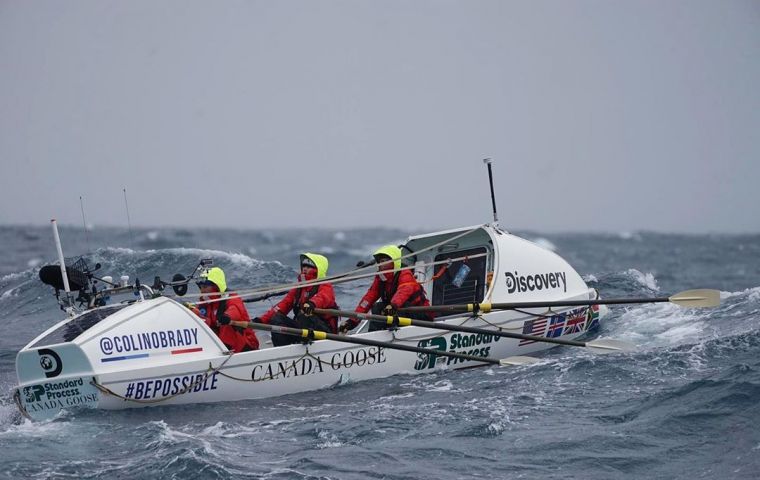MercoPress. South Atlantic News Agency
Freezing record: Six men cross the Drake Passage to Antarctica rowing, in 13 days
 “This is a really big deal in Antarctic history to hear about this,” said Wayne Ranney, a Flagstaff, Arizona-based geologist who has led expeditions to Antarctica
“This is a really big deal in Antarctic history to hear about this,” said Wayne Ranney, a Flagstaff, Arizona-based geologist who has led expeditions to Antarctica As freezing water thrashed their rowboat in some of the most treacherous waters in the world, six men fought for 13 days to make history, becoming the first people to traverse the infamous Drake Passage with nothing other than sheer manpower.
They dodged icebergs, held their collective breath as giant whales breached near their small boat, and rode building-sized waves while rowing 24 hours a day towards Antarctica.
The team of men from four countries finished crossing the Drake Passage on December 25 in just under two weeks after pushing off from the southern tip of South America.
“This is a really big deal in Antarctic history to hear about this,” said Wayne Ranney, a Flagstaff, Arizona-based geologist who has led expeditions to Antarctica and crossed the Drake Passage in motorized vessels more than 50 times.
”One hundred per cent of their progress was done with those 12 arms for 600 (nautical) miles. That's just phenomenal. I can't even imagine.“
Besides the threat to their lives, the men labored under grueling conditions. Their 9m rowboat, named the Ohana, had to be in constant motion to avoid capsizing. That meant three men would row for 90 minutes while the other three rested, still cold and wet.
”You're rowing inside an open hold, 40-foot sea waves are splashing in your face, near-freezing water is splashing over the bow,“ said 34-year-old Colin O'Brady of Jackson Hole, Wyoming, one of the six men on the boat.
The men had to use a bucket to go to the bathroom. To rest, two men needed to lie shoulder to shoulder in a tiny space while a third would lay in a fetal position in an even smaller area.
”You're curled up and jammed into a small space, trying to get a few winks of sleep before the alarm would go off and boom, you're back at it again,“ O'Brady said.
The toughest part for O'Brady's fellow rower, Jamie Douglas-Hamilton of Edinburgh, Scotland, was the constant bombardment from the elements.
”We were hit by winds from every single direction... and the seas down here are very violent - it's the roughest ocean in the world,“ the 38-year-old said. ”We almost capsized many times, and the problem with that is the water is so cold that if you go in, you've probably got two to five minutes.“
Physically, Douglas-Hamilton said he fought crippling seasickness and numb hands and feet. At one point, a strap he had to wear around his ankles while rowing wore through his boots and cut into his skin all the way to the bone.
”It was absolute agony,” Douglas-Hamilton said.
The other men on the expedition were: Fiann Paul of Reykjavik, Iceland; Cameron Bellamy of Cape Town, South Africa; Andrew Towne of Grand Forks, North Dakota; and John Petersen of Oakland, California.
Paul, Douglas-Hamilton and Bellamy are record-breaking ocean rowers, Towne is a championship rower and has climbed the tallest mountain on every continent, and Petersen was a championship college rower.
The row across the Drake Passage is just the latest adventure for O'Brady, who became the first person to traverse Antarctica alone without help last year.




Top Comments
Disclaimer & comment rules-

-

-

Read all commentsI have a question - “Why?”
Dec 30th, 2019 - 10:17 am 0Why climb Mt Everest, it’s there to be done perhaps.
Dec 30th, 2019 - 03:10 pm 0One is a Capetonian - Incredible journey and unbearable hardship - I didn't see this reported on the BBC, perhaps because the crew wasn't “diverse” enough to warrant praise...!
Dec 31st, 2019 - 06:19 am 0Commenting for this story is now closed.
If you have a Facebook account, become a fan and comment on our Facebook Page!